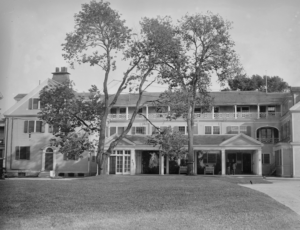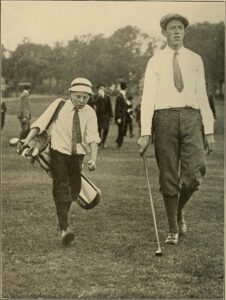By David Wilkening, Contributing Writer

BROOKLINE – The U.S. Open held at The Country Club (TCC) in Brookline in June is history now. But the tales about the iconic course live on after the event brought together the world’s greatest golfers and thousands of spectators.
Eclectic beginning
One of the most popular stories was how it all got started. The original six-hole course was laid out when Grover Cleveland was in the White House. The year was 1882. Three sports-minded Boston friends were behind it. Long gone: the original cinder race track where horses galloped to cheering crowds.
Retired sportswriter Frederick Waterman recalled that history during an interview in 2013. The pompous-sounding name “The Country Club” was far more accurate than you might think.
“When it was founded, it was the only ‘country club’ in the western hemisphere, so it didn’t need to distinguish itself from any other,” he told US Golf Atlas.
One of the founders, J. Murray Forbes, was a China trader. He knew of a night club in Shanghai. And gave it the name.
At the time, there was far more interest in horse racing. It was started as a “sporting club.” Golf was not among the first sports there. The original clubhouse had an enormous viewing grandstand. And a steeplechase course, as well as lawn tennis and croquet.
For things that visitors can only speculate about, there’s membership and costs at the country club. Both unknowns.
Assorted writers have attempted unsuccessfully to determine both issues. A perk of belonging is anonymity. So the names of the 1,300 or so members is kept strictly confidential.
As far as costs go, the closest the public might know are from lists of the most expensive golf clubs in America. The Madison Club in La Quinta, Calif. has fees of $200,000, making it one of the most costly in the US. The Winged Foot Golf Club in New York costs the same.
Famous rejects
But another story discussed are the well-known rejects of the TCC.
In his 2011 memoir, “A Reason to Believe,” former governor Deval Patrick revealed that he and his wife, Diane, were rejected―“blackballed,” he wrote―by TCC.
More recently, former New England Patriots Quarterback Tom Brady and his wife, model Giselle Bundchen, applied for membership in 2015. Older members reportedly worried they might create a spectacle, according to news accounts. She was finally admitted a few years later, which meant that he also became a member. But even the NFL’s most famous quarterback had to wait a long time before ultimately being accepted.
The father of amateur golf

But perhaps the far more popular story involved Francis Ouimet. The 20-year-old former caddie and self-taught player lived next door to The Country Club and only had to carry his clubs across the street to win the 1913 US Open. His stunning triumph over two of Britain’s best golfers was dramatic enough to be the subject of a popular Hollywood movie, “The Greatest Game Ever Played,” starring Shia LaBeouf as the improbable victor.
Francis Ouimet had a “secret weapon” to win the 1913 U.S. Open. It “wasn’t a particular set of clubs, nor his familiarity with the course at The Country Club, which he could see from his bedroom window,” wrote Golf Digest.
When the amateur won the title in an upset against British veterans Harry Vardon and Ted Ray, he credited his caddie, Eddie Lowery, a 10-year-old Newton boy who was his loudest cheerleader.
The stunning victory cemented a place for Ouimet and Lowery―and The Country Club―in golf history.
A 20-year-old Brookline native who had caddied at TCC, Ouimet was fresh off a loss in the U.S. Amateur Championship when the president of the United States Golf Association asked if he would play in the Open. Though he initially declined, Ouimet joined after his boss gave him time off to play.
Finding a caddie for him proved more difficult.
Lowery and his brother, Jack, played hooky from school to watch the play at TCC, and Jack agreed to caddie for Ouimet after the golfer’s original man bailed. When a truant officer caught Jack, however, Eddie took three street cars over to TCC and pleaded with Ouimet to take his brother’s place.
“I’ve never lost a ball,” he said, which was not really true.
Ouimet (1893–1967) was an American amateur golfer who is frequently referred to as the “father of amateur golf” in the United States. He was the first non-Briton elected Captain of the Royal and Ancient Golf Club of St. Andrews. He was inducted into the World Golf Hall of Fame in 1974.
A thumbs up from Roger Ebert
The famed late film critic Roger Ebert wrote of the 2005 movie:
“’The Greatest Game Ever Played’” was a game of golf, in case you thought your team might have been involved. In 1913, a working-class American amateur named Francis Ouimet defeated the great British player Harry Vardon to win the US Open.”
He views the movie as one that “tells that story and exactly that story, devoting a considerable amount of its running time to the final rounds and playing like one… a superb sports telecast.”
“Because some of the opening scenes seem borrowed from other underdog movies, I was surprised to realize, toward the end, how gripping the movie had become,” he concluded.
Despite The Country Club’s penchant for privacy, it’s been immortalized by Hollywood, even if a golf course in Quebec was the setting for the golf scenes, rather than Brookline.
RELATED CONTENT:
Local Men form Worcester County Senior Golfers traveling club (fiftyplusadvocate.com)
One of world’s best-known castles is found in Gloucester (fiftyplusadvocate.com)
The road ended where it began for ‘The father of the Beats’ (fiftyplusadvocate.com)












